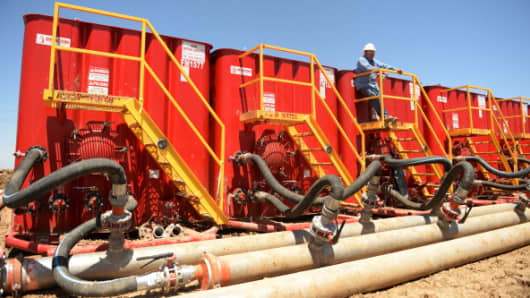The United States released new regulations for fracking
on federal and Indian lands that it said would put minimal costs on the
booming American oil and gas sector, but some estimates place the
actual impact of the rules as much as 84 times larger—and that cost
isn't even the industry's biggest worry.
The Bureau of Land Management
estimates that the compliance cost for its new policies will run about
$11,400 per well, or roughly $32 million per year to the industry in
total, the agency wrote in its nearly 400-page final rule, released Friday. On the other hand, an analysis of a draft rule
from research and consulting firm Advanced Resources International
estimated total annual costs associated with the regulation could range
anywhere from $30 million to $2.7 billion in total. And at l
east one industry group leader puts the cost higher than that.
Read MoreThe state that drills the most on Uncle Sam's turf
Erik Milito, director of upstream and industry operations for the American Petroleum Institute, told CNBC that his energy trade association is still assessing costs of the new regulation, but that some elements of the final rule could prove more expensive than what's come out in a draft.
east one industry group leader puts the cost higher than that.
Read MoreThe state that drills the most on Uncle Sam's turf
Erik Milito, director of upstream and industry operations for the American Petroleum Institute, told CNBC that his energy trade association is still assessing costs of the new regulation, but that some elements of the final rule could prove more expensive than what's come out in a draft.
"You look at any state ruling and there's a lot of ambiguity and question marks and it hasn't slowed the industry down...I don't think it's going to be a deal killer by any stretch."
The biggest concern for the industry, he said, is that
ambiguities of the new regulations (which came together over four years)
could stifle future investment.
"It's all about an industry that just simply wants to have certainty and predictability in the regulatory regime so that you can have the confidence to invest," Milito said. "And we're seeing that torn down in many respects."
The industry has decried the regulatory changes as redundant and based on unsubstantiated concerns. Two groups, the Independent Petroleum Association of America and the Western Energy Alliance, filed a lawsuit against the rule in the U.S. District Court for the District of Wyoming.
Read MoreExpect Russian spoiler in Iran nuke talks: critic
But the government insists the new rules are necessary and easily managed by companies.
"Most Americans would call them common sense," U.S. Secretary of the Interior Sally Jewell said of the regulations on a media conference call on Friday. Neil Kornze, director of the Bureau of Land Management, said the costs to comply with the rule would only amount to less than one quarter of 1 percent of the price to drill a well.
Aside from costs, a big question about the new rule is whether government regulators can move as quickly to verify compliance as the BLM estimates assume, oil industry sources told CNBC.
"It's all about an industry that just simply wants to have certainty and predictability in the regulatory regime so that you can have the confidence to invest," Milito said. "And we're seeing that torn down in many respects."
The industry has decried the regulatory changes as redundant and based on unsubstantiated concerns. Two groups, the Independent Petroleum Association of America and the Western Energy Alliance, filed a lawsuit against the rule in the U.S. District Court for the District of Wyoming.
Read MoreExpect Russian spoiler in Iran nuke talks: critic
But the government insists the new rules are necessary and easily managed by companies.
"Most Americans would call them common sense," U.S. Secretary of the Interior Sally Jewell said of the regulations on a media conference call on Friday. Neil Kornze, director of the Bureau of Land Management, said the costs to comply with the rule would only amount to less than one quarter of 1 percent of the price to drill a well.
Aside from costs, a big question about the new rule is whether government regulators can move as quickly to verify compliance as the BLM estimates assume, oil industry sources told CNBC.
Although much remains unknown about the rule's implementation, an independent analyst told CNBC that the government's estimates are probably nearer to reality than the industry-provided figures.
"I think it would be much closer to the BLM's number," said Michael Scialla, oil and gas analyst at Stifel, adding that he didn't see any uncertainties from the regulations affecting investment.
"You look at any state ruling and there's a lot of ambiguity and question marks and it hasn't slowed the industry down," he said. "I don't think it's going to be a deal killer by any stretch."


No comments:
Post a Comment